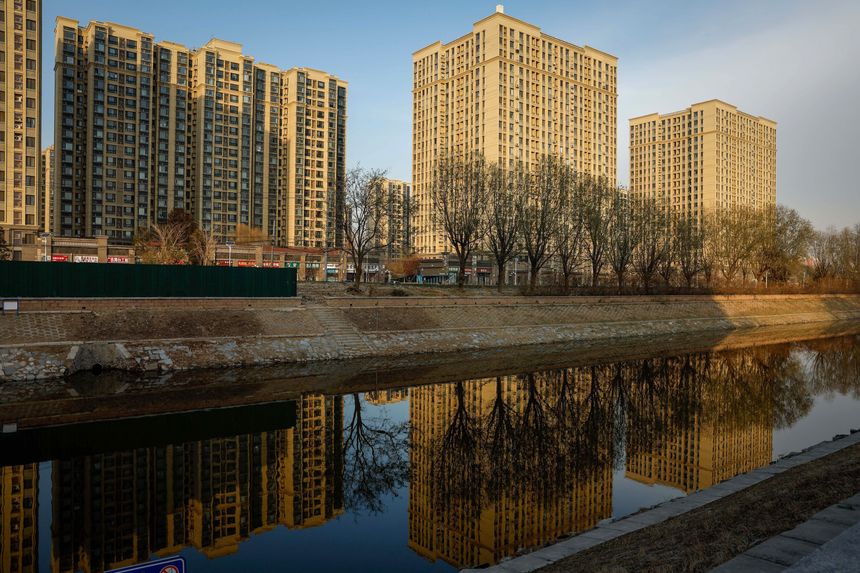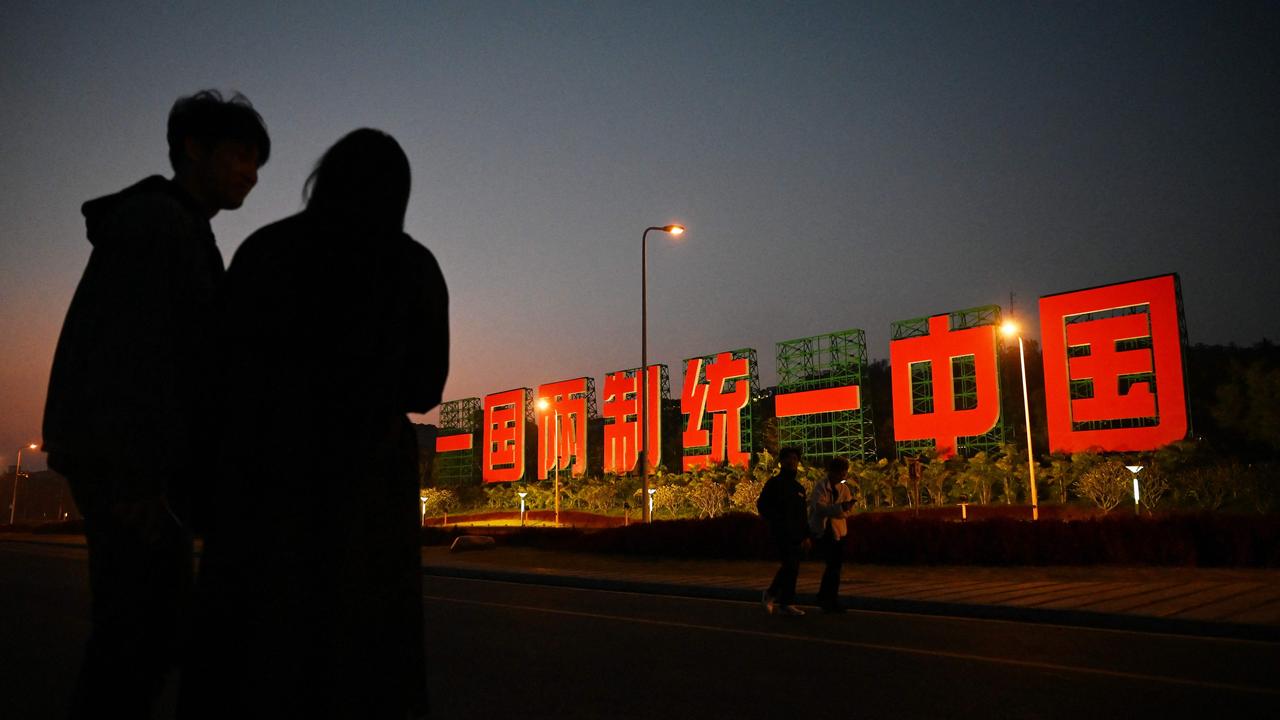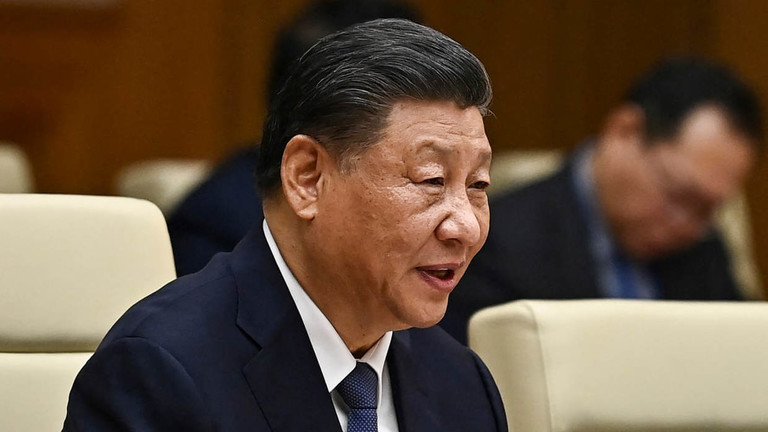This article is more than
1 year oldA sports star. An actor. Now a top diplomat: Why do China's public figures keep disappearing?
- One Chinese disappearance was an X-Men movie star who later thanked the government for her vanishing, saying it was part of life's journey.
- Alibaba billionaire Jack Ma has rarely been seen in public since he criticized China's financial regulators.
- Qin Gang, one of China's most powerful diplomats, disappeared in late June.
Sometimes the disappearance is connected to suggestions there was an affair, maybe even a sexual assault allegation. There could be hints of professional jealousy; it's the outcome, say, of a simmering, behind the scenes power struggle. At other times, the whiff of corruption appears to emit a strong odor.
There's many more cases that involve government critics: protesters, human rights champions, Uyghurs and other ethnic minorities. There's also examples that confound quick explanation: the rich tech entrepreneur, the Chinese chief of an international police organization, the glamorous movie star adored by hundreds of millions.
Recently, the disappearance that has bewildered China watchers and led to unbridled social media speculation inside and outside the country is that of its top foreign affairs diplomat, Qin Gang, who went missing over a month ago. He vanished just as Washington and Beijing made a renewed push to stabilize strained relations.
China, Russia send warships near Alaska:US responds with Navy destroyers
"This is how the system protects itself," said Pavel Slunkin, a former diplomat from Belarus, a country where prominent opposition figures of President Alexander Lukashenko were kidnapped and murdered in the 1990s.
"Authoritarian governments treat information as a threat. That's why they need to control it. It was this way in the Soviet Union. It's this way today in China, in North Korea, in Iran, in Belarus."

U.S. says China is committing genocide:Here's some of the most chilling evidence
But it is the Chinese government, many say, that has taken the practice of "disappearing" high-profile figures to new, or at least head-scratching, heights. And in recent years this activity, which Beijing studiously avoids publicly addressing to the extent that it often pretends nothing has happened, has touched the country's billionaires, corporate titans, security chiefs, actors, scientists, sports stars and diplomats alike.
"A lot of what we think we know about these cases is just speculation,'' said Yaqiu Wang, a senior China researcher at Human Rights Watch. "Some of this speculation may eventually turn out be true, of course, but what it shows is the black-box nature of China's political system; its arbitrary and unaccountable power."
The Qin Gang affair
Since late June, this black box has enveloped Qin, China's former foreign minister, who was just seven months into the job when he completely faded from public view without any official explanation.
He was last seen in public on June 25 in Beijing.
Qin was smiling as he walked side by side with Andrey Rudenko, a senior Russian foreign ministry diplomat. A week earlier, Qin, 57, widely described as a protege of China's President Xi Jinping, played a prominent role in hosting Secretary of State Antony Blinken during the highest-level trip to China by a U.S. official since 2018.
Blinken's visit came in the wake of a diplomatic fallout between the two countries after Washington accused Beijing of operating an extensive international surveillance program. This allegation, which Beijing denied, was neatly illustrated by a Chinese balloon that flew over U.S. airspace without permission. The U.S. shot it down.
Qin's meeting with Blinken took place without any obvious signal of the Chinese diplomat's impending downfall.
"The two sides had candid, substantive, and constructive discussions on key priorities in the bilateral relationship and on a range of global and regional issues," Matthew Miller, a State Department spokesperson, said of the trip.
Diplomatic tango:Blinken heads to China. But thawing relations will take more than a meeting
Yet over the next few weeks a series of high-level meetings Qin was expected to attend were abruptly cancelled. He was not present, for example, when U.S. Secretary of the Treasury Janet Yellen undertook a four-day visit to China the first week of July. He did not participate in an important summit of regional Asian leaders that kicked off in Jakarta, Indonesia, about a week later − an absence that China's foreign ministry said was for "health reasons." By the middle of July, Qin's name had been removed from the foreign ministry's website and spokesperson Mao Ning said she had "no information" about him when pressed by reporters in briefings.
Qin had, effectively, vanished into thin air.
It appeared to be an extraordinarily precipitous fall from grace for one of China's most powerful diplomats. Qin was a close Xi ally. He had risen through the ranks of the Chinese Community Party faster than most. He was named foreign minister after spending less than two years as China's ambassador to the U.S.
What's more, Qin appeared to meticulously exemplify, according to Altman Yuzhu Peng, a Chinese-born communications scholar at the University of Warwick, England, the idea of the "wolf warrior."
The term is a shorthand expression for the style of aggressive and confrontational Chinese diplomacy that's been adopted by the Xi administration. It stems from the 2015 Chinese action movie of the same name that features skilled Chinese army heroes fighting villains in Asia and Africa but whose real enemies appear to be U.S. foreign policy, Western geopolitical dominance and critics of the Chinese government more broadly.
"Qin's disappearance is really hard to explain," said Peng. "He's very well aligned with the wolf warrior image."
And yet, according to seasoned China watchers such as Christopher Johnson, a former Central Intelligence Agency analyst of Chinese politics, Qin's sudden disappearance conforms to a familiar pattern in China.
"It's actually pretty common," said Johnson, who is now the president of the China Strategies Group, a Washington-based political and financial risk consulting firm focused on the superpower country.
"China has a system they call 'double restrictions','' he said. "It's a form of extrajudicial detention where the authorities can keep you as long as they want without charge while they investigate whatever part of the puzzle you may or may not be. It is a very unusual and opaque system, and the purpose is usually to generate fear."
China's mysterious disappearances
In May, Duan Weihong, 56, once one of China's wealthiest women, made her first known public appearance in five years. Duan built her fortune in real estate development and by facilitating investment opportunities for family members of some of China's most senior officials, including former premier Wen Jiabao.
Duan, who also goes by the name "Whitney Duan," vanished from her Beijing office in 2017 as Chinese Communist party investigators probed her links to Sun Zhengcai, a former government minister who is serving a life sentence in China after admitting to taking millions in bribes. Duan has only briefly surfaced once before since her unexplained disappearance. In 2021 she called her former husband and business partner, who lives in exile in the United Kingdom, to urge him to stop publication of a book that details the couple's business dealings.
Tennis star Peng Shuai is vanishing:Much like China's #MeToo movement
Many other Chinese public figures have suffered equally puzzling fates:
- Chinese tennis star Peng Shuai, 37, a three-time Olympian who won 25 career tour titles, disappeared in November 2021 after she claimed in a social media post that China's former vice premier Zhang Gaoli forced himself on her in his bedroom while his wife stood guard outside. Her post was quickly scrubbed from the Internet and the Chinese government alternated between saying Peng was "resting at home" and that it had not heard of the issue. A month later, Peng retracted her allegation, saying there had never been any sexual assault, a difficult to understand assertion given that her original post described the alleged incident in detail. When Peng showed up for what looked like a series of highly staged appearances at the Beijing Winter Olympics, in February 2022, she again recanted her original claims about an assault and also announced her plans to retire from tennis. Few believe she was speaking freely. Her current level of freedom is not clear.
- In 2018, Fan Bingbing, 41, one of China's most famous domestic movie stars who has also appeared in the "X-Men" franchise, disappeared for four months. Her manager and others around her also vanished. Rumors surfaced online that she was being held as authorities investigated her for tax evasion. In 2019, Fan broke her silence in an interview in which she appeared to thank the Chinese authorities for "disappearing" her. "No one can have smooth sailing throughout the journey," Fan told The New York Times in August that year. "It may be a trough I encountered in my life or in my work, but this trough is actually a good thing. It has made me calm down and think seriously about what I want to do in my future life," she said in the interview.
- Jack Ma, 58, the billionaire founder of Alibaba, a Chinese competitor to Amazon and on some measures the world's largest online commerce firm, has rarely been seen in public since he criticized China's financial regulators in 2020. Ma, a former English teacher, was last spotted at a school in China in March, according to the South China Morning Post, a Hong Kong-based English-language newspaper that is owned by Alibaba.
- The first Chinese had of Interpol, the France-based international police organization, disappeared in 2018 while he was on a visit to China. Meng Hongwei, who had been due to serve in the role until 2020, inexplicably resigned from his position days after his wife reported him missing. In late 2020, Meng surfaced in a Chinese court, where he was sentenced to almost 14 years in prison for allegedly misusing state funds. His wife, who has been given political asylum in France, claims the charges are politically motivated.
More:Tennis star Peng Shuai is vanishing: Much like China's #MeToo movement
"A more charitable interpretation of all these events is that the Chinese Communist Party, which is obsessed with corruption, is really concerned about protecting its reputation," said Lyle Goldstein, an expert on China who runs the Asia program at Defense Priorities, a Washington think tank.
Goldstein pointed out that days after Qin was removed from his post, China abruptly announced it had replaced two top commanders of its nuclear and missile arsenals, a move that could be connected to corruption allegations. The two generals, Li Yuchao and Liu Guangbin, have not been seen in public for months.
"It seems like they want to be opaque," Goldstein said of China's apparent strategy for appointing and dismissing key officials and military leaders. He said that strategy has "got a lot of people" in Washington "worried" as China's military capabilities increasingly match, and in some cases, surpass the Pentagon's.
'Triple awkward': Mr. Wang Yi goes to Washington
China named veteran diplomat Wang Yi, Qin's predecessor, its new foreign minister on July 25.
There has still been no formal explanation for the abrupt personnel change.
Qin has still not been seen in public. His whereabouts have also not been disclosed.
Johnson, the former CIA analyst, said that Qi's sudden removal was "triple awkward" for U.S. and Chinese officials and their staff during a period of renewed diplomatic activity; when both sides are attempting to stabilize an at-times fractious relationship amid deepening economic, technological and military competition.
But he did not think it would have much of an impact on U.S. or Chinese policy.
And in one sign of this apparently business-as-usual state of affairs, Miller, the State Department spokesman, said during a briefing with reporters on Aug. 1 that an invitation to visit Washington that had previously been extended to Qin had been officially transferred to Beijing's new top foreign affairs diplomat.
"We, as outsiders, aren't necessarily supposed to understand why China does this," said Johnson, reflecting on what could be driving not just Qin's disappearance, but myriad others like it.
"Usually it has more to do with internal skullduggery than anything else."
Xi himself mysteriously disappeared for two weeks in 2012 when he was China's vice president in an episode that has never truly been explained. Chinese officials later said he suffered a sports injury. Xi also stayed out of public sight for a few weeks in 2022 after a trip to central Asia, sparking false rumors of a coup.
Suspected Chinese spies:Disguised as tourists, they tried to infiltrate Alaskan military bases
A 2 a.m. phone call with Qin Gang
Still, one theory doing the rounds on social media and among some experts is that Xi ordered Qin's removal after he learned he had an affair − that led to a son − with a TV journalist. Another is that, perhaps as a result of his time as a diplomat in the U.S., he was "turned" − recruited as a spy − by U.S. and British intelligence services.
Another is that, Icarus-like, Qin simply flew too close to the sun.
He was promoted too quickly in a country that for all its rapid modernization is still rigidly hierarchical and places great cultural value on climbing the ranks through slow, steady, hard work. In this theory, Qin flew higher and higher, then as the sun melted the diplomatic wax in his wings, he tumbled into the sea and drowned.
"I've seen all the rumors and I'm pretty skeptical about a lot of them," said Slunkin, the former diplomat from Belarus, who encountered Qin in that country in 2015 when he was involved with helping to arrange a visit by Xi.
Slunkin is now a visiting fellow at the European Council on Foreign Relations' Warsaw, Poland, office. He stressed that he only spent a short period of time with Qin, and does not consider himself an expert on China.
But he recalled a figure who to him seemed to have a "more modern, more Western" manner compared to the dozens of "conservative" ministry officials Qin was working with to make sure Xi's visit to Belarus encountered no hiccups. He said Qin spoke excellent English and many of his subordinates were afraid of him.
He also described a moment when he was awoken at 2 a.m. by a telephone call from Qin who wanted, at that precise moment, to go to a museum Xi was due to visit the next day. He wanted to go over the plan. This included a lengthy discussion of the exact moment "solemn music" would turn on as Xi walked up some steps.
"I would say his disappearance is probably a combination of all the points we are discussing in public," he said.
Related:China's latest provocations is a spy base in Cuba. Here's why that concerns experts.
Keywords
Newer articles
<p>A bill that will ban TikTok in the United States unless its Chinese owner divests from the company has passed overwhelmingly.</p>
Congress gets closer to forcing TikTok to be sold or face US ban: What's ne
Israel Iran attack: Damage seen at air base in Isfahan
Ukraine ‘will have a chance at victory’ with new US aid, Zelenskyy says
Who will be Trump’s VP? A shortlist
Ukraine war: Kyiv uses longer-range US missiles for first time
House passes potential TikTok ban that could speed through Senate
How soon could US ban TikTok after Congress approved bill?
Caught between Israel and Iran, Jordan clings desperately to stability
Congress passes bill that could ban TikTok after years of false starts




